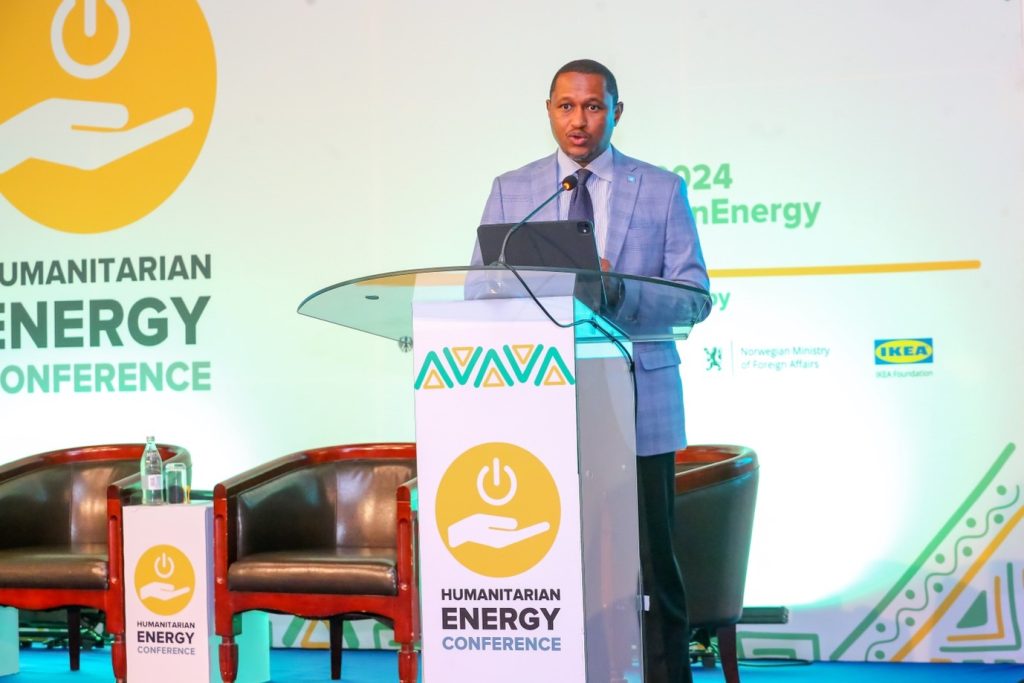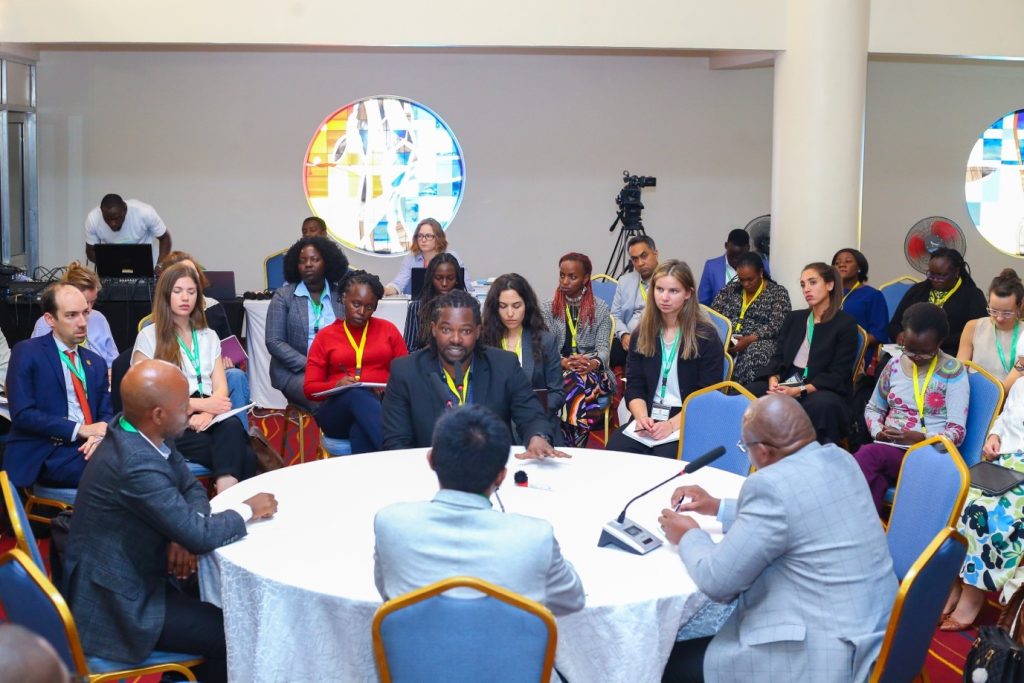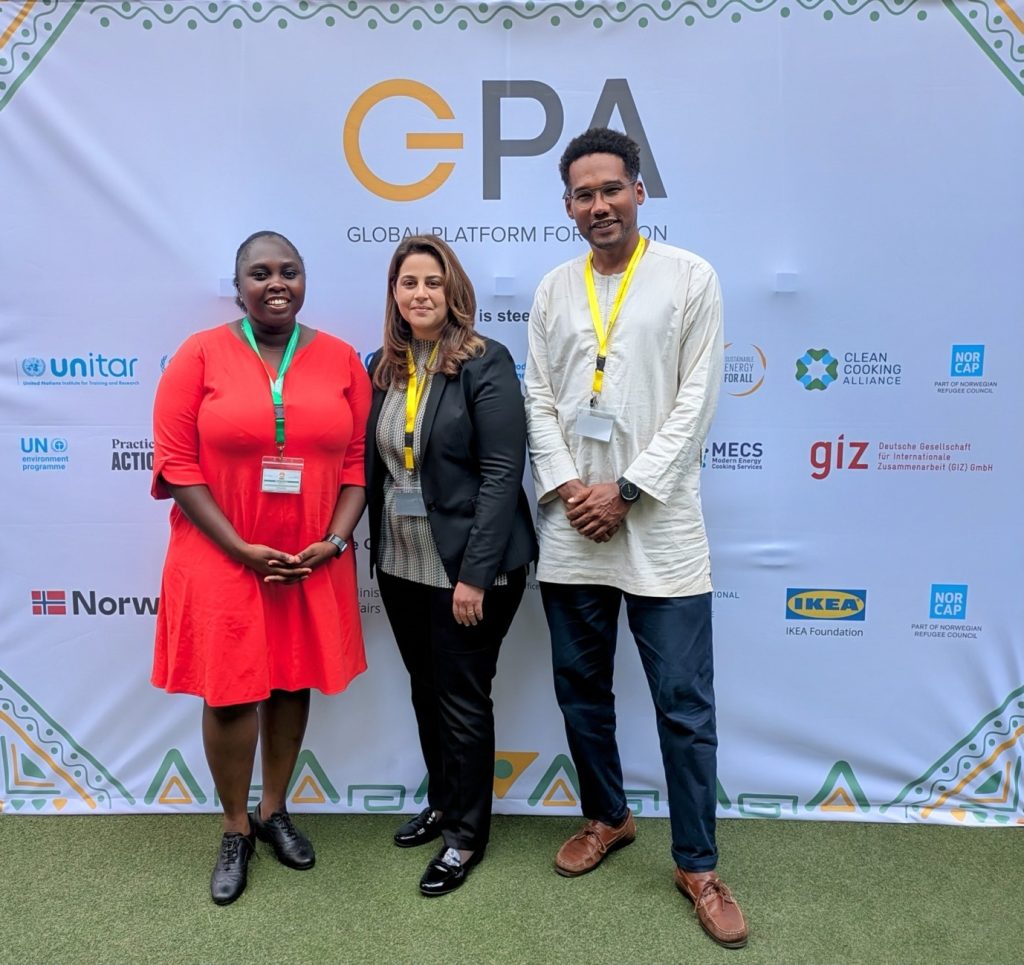
- Date
- 6th January 2025
- Categories
- Humanitarian energy
By Jacob Fodio Todd (Gamos Ltd.), Dr Yesmeen Khalifa (Loughborough University) & Beryl Onjala (Gamos East Africa).
On Monday 7th October 2024, the 3rd edition of the Humanitarian Energy Conference was organised by the Global Platform for Action on Sustainable Energy in Displacement Settings, in Nairobi. An energetic MC kicked off the event – attended by over 250 people – before a host of opening remarks from a range of dignitaries including the Kenyan Commissioner for Refugee Services, John Burugu, and Mamadou Dian Balde, the UNHCR Regional Director for Eastern Africa and the Great Lakes. These opening remarks drew attention to the funding gap caused by the growing disparity between the ever-increasing numbers of displaced persons in recent years and static or decreasing investment, as well as various energy security and environmental challenges including the relationship between large scale migration and climate change.

A panel of high-level representatives emphasised the importance of gathering those involved in the humanitarian sector, as well as highlighting the complexities of these settings. Despite constantly evolving settings and changing emergencies, many refugees and displaced persons are in protracted situations that require durable solutions and long-term approaches. It was noted that the majority (an estimated two thirds) of displaced people are not likely to return within five years, after which likelihood of return to where they came from diminishes further. Furthermore, 94% of people living in refugee camps, settlements and other displacement settings live without electricity. The centrality of energy – it was repeatedly emphasised – must be included into the broader range of themes crucial for addressing the challenges of displaced settings. This requires the use of integrated and systems approaches to incorporate energy and clean cooking access into the development of humanitarian and displacement settlements and the energy planning of host countries’ national targets and policies.
Government commitments are needed to ensure access to energy and clean cooking in displacement settings and leverage international finance. Carbon financing is playing an important role but facing a lot of challenges in humanitarian and displacement contexts, which include high levels of risk due to political and economic instability, complex administrative environments, and actual and perceived frequent population movement with associated project implementation and monitoring challenges. Creative and innovative financing solutions are needed for sustainable and resilient energy solutions and cross-sectoral collaboration for planning lifesaving services. Actions are also needed to integrate climate action with energy and clean cooking planning and access. The importance of the involvement of the private sector was raised several times and the need to draw more investments into such complex settings was heavily emphasised.

Personal and lived experiences were shared and the centrality of adding these voices to ongoing conversation was emphasised by Joelle Hangi, Inclusivity Advisor at the GPA Coordination Unit: “diversity is who is in the room, inclusion is who has influence in that room”. Presenters highlighted the importance of co-creating projects with refugees to understand their needs and to support and finance refugee-led businesses and entrepreneurs. There were two groups of programmed breakout sessions for all participants, and each room employed a different facilitation technique; fishbowl (circular chairs centred around a roundtable, with rotating speakers); world café (different tables with facilitators and periodic shifts); and the more common regular panel and audience discussion. Several themes were covered, one revolving around clean cooking, of particular interest to MECS researchers.

Dr Iwona Bisaga introduced several presentations, including from MECS and Gamos East Africa’s Beryl Onjala who discussed findings from work trialling EPCs in institutional settings being undertaken with SNV in Kakuma Refugee Camp and Kalobeyei integrated settlement. Ayoo Irene Helen (Partnership Officer, Last Mile Climate), highlighted the challenges that refugees face due to the lack of access to clean cooking in a refugee camp in Uganda where approximately 99% of refugees rely on firewood and charcoal for cooking. Some women travel more than 18 km to collect firewood, putting them at risk of gender violence and some families cannot afford charcoal, so they cook using plastic bottles. An LPG pilot project in Mauritania, presented by Emma Wheeler (NORCAP/WFP) and supported by MECS, was also introduced, showing up to a 65% cost reduction of biomass cooking fuels in participating schools. The importance of finance mechanisms such as demand-side subsidies and results-based financing for refugees was also stressed.

The lack of accurate data on energy and clean cooking in humanitarian and displacement settings was mentioned several times: good and accurate data is important to inform policy, make better decisions and to improve the delivery of projects. On this topic, new and established sector tools were mentioned including the Displacement Tracking Matrix, and the African Knowledge Platform which includes climate data to ensure the sustainability and resilience of energy and clean cooking solutions. Several opportunities presented themselves for networking amongst all attendees with coffee and tea breaks throughout the day, with representatives from a wide range of actors working in the humanitarian energy field.
There was so much content and learning to summarise succinctly in a short blog but it was great to see the impact of MECS as a research knowledge partner, as many organizations acknowledged the programme for their support and contribution to many projects. Summarising the day, Dr Rafaella Bellanca from WFP gave a pertinent comment for MECS and the clean cooking landscape: “I couldn’t help noticing that a good amount of the initiatives presented were about eCooking… It may seem normal, but it isn’t… Until 5 years ago [the year of the first HEC], it was like talking about fairytales in a land of fairies… We should celebrate. We made progress!”

…………………………………
Featured image, top: Participants at the Humanitarian Energy Conference [photo credit: © UNITAR / GPA-CU].